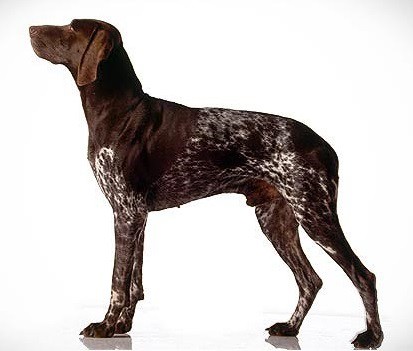Type the name of the breed you're looking for below
[wpdreams_ajaxsearchlite] Don't see the breed your're looking for? Click here and let us know!
Breed Characteristics
1 paw - breed exhibits the least amount of this characteristic
5 paws - breed exhibits most amount of this characteristic
German Shorthaired Pointer
| Other Names | Deutscher Kurzhaariger Vorstehhund, Deutsch Kurzhaar, Kurzhaar, German Short-haired Pointing Dog |
| Nicknames | GSP, DK |
| Country of Origin | Germany |
| Weight | Males: 55 - 70 lbs. (25 - 32 kg) Females: 45 - 60 lbs. (20 - 27 kg) |
| Height (at withers) | Males: 23 - 25 in. (59 - 64 cm) Females: 21 - 23 in. (53 - 58 cm) |
| Coat | The short coat is thick and rough to the touch. It is slightly longer on the underside of the tail and the back edge of the hips, and softer, shorter and thinner on the head and ears. |
| Colour | Coat colours include solid liver, liver and white, liver ticked or patches, white ticked or liver roan. |
| Litter Size | 7 - 8 puppies |
| Life Span | 12 - 15 years |
| Origin & History | The German Shorthaired Pointer breed was developed in Germany during the 1800's for hunting. They were created by crossing old Spanish pointers with numerous other breeds such as scent hounds and tracking hounds; Foxhounds, Italian Pointers, German Tracking Hounds, German Bird Dogs, and English Pointers. The combination created a responsive, lean, hunting dog with great versatility, being able to retrieve both fur and feather, on land and water. Breeders focused on the basis of function rather than form, in creating the breed. German Shorthaired Pointers were accepted into the American Kennel Club in 1930, their parent club holding the first specialty show in 1941. The efforts of nineteenth century German breeders, has created a dog today that is one of the most versatile of all gun dogs and an ideal weekend hunter. They do well in companion hunting as well as field trials, hunt tests, tracking trials, and the show ring. |
| Personality | One of the most energetic breeds, the German Shorthaired Pointer is a hunting dog by nature. Protective, clever, eager and willing to please, it is very fond of its human family. Happy-go-lucky, it loves nothing more than to engage in some type of constructive activity with its owners such as a long walk, jog, hike, hunt, or a game of Frisbee. This breed is not suited to life in a kennel. Faithful, spirited and friendly, it likes and mixes well with children. Dominancy and energy levels vary slightly from puppy to puppy even within the same litter, however those bred for working in high-performance field competitions usually require more activity than the average Shorthair, but are all still very high energy dogs who need a lot of daily exercise. Best suited for an active family. When they lack in exercise they can become high strung and frustrated. The GSP will not listen if it senses that it is stronger minded than its owner, however it will also not respond well to harsh discipline. The GSP needs an owner who displays a natural air of authority providing firm, but calm, confident and consistent with rules it must be made to follow. The GSP crave order and need structure in its life. If this breed lacks in either exercise or leadership it can develop separation anxiety and possibly become destructive and nervous. Well adjusted, stable minded GSPs who receive enough mental and physical activity along with a balance of consistent leadership will get along with other dogs and cats. This breed likes to bark and can be reserved with strangers. Socialize well. They will be in their glory if they are actually used for what they were bred for and taken on hunting trips. |
Care Requirements
| Health | Most German shorthaired pointers are tough, healthy dogs, but according to Mayor B. Loney, DVM (NAVHDA Versatile Hunting Dog Magazine, April, 2003) the breed can be subject to a number of hereditary disorders due to their breeding. A few individuals may suffer from hip dysplasia, genetic eye diseases, epilepsy, skin disorders and cancerous lesions in the mouth, on the skin and other areas of the body. As with other breeds, unspayed female GSPs are prone to breast cancer. This risk is reduced if they are spayed. Like many other deep-chested dogs, German shorthaired pointers are highly prone to gastric torsion, AKA bloat. Correct precautions, such as refraining from feeding immediately before or after exercise, feeding several smaller meals throughout the day instead of a single, large one and avoiding the consumption of large amounts of water with dry food, should always be taken. As with any other hunting dog, contact with game can cause the spread of fungi and bacteria that can easily colonise in the gums or cause infections on open wounds and small cuts from scratching against plants and bushes during a regular hunting session. |
| Grooming | The smooth coat of the Pointer is very easy to groom. Just brush regularly with a firm bristle brush and bathe only when necessary. A rub with a piece of toweling or chamois will leave the coat gleaming. Check the feet also, especially after the dog has been exercising or working. Dry the dog thoroughly after hunting to prevent chilling. Examine the ears regularly. This breed is an average shedder. |
| Exercise | Exercise is of paramount importance for these tireless, energetic animals. They are more than a match for even the most active family and they should not be taken on as family pets unless they can be guaranteed plenty of vigorous exercise. They need to be taken on a daily, brisk, long walk, jog or run alongside you when you bicycle. If under-exercised, this breed can become restless and destructive. |
| Other Considerations | This breed is not recommended for apartment life and does best with a large yard and an active, athletic family. It may be able to jump any fence that is lower than 6 feet tall. Under exercised, bored GSPs are great escape artists. Thomas Mann's great love for his German Shorthaired is told in the book Bashan and I. Robert B. Parker's most popular mystery series features a Boston detective known only as Spenser who has had a series of three solid-liver German shorthairs, all named Pearl: one who stood with him during a bear charge in his rural youth; one given to his girlfriend by her ex-husband; and the third Pearl, to keep company with Spenser and his girlfriend in their late middle age. Author Parker appears on many of the Spenser dustjackets with a solid-liver GSP male identical to the three incarnations of Pearl in the series. Rick Bass's ruminations on living and hunting with a German shorthaired pointer in Montana can be found in the book Colter: The True Story of the Best Dog I Ever Had. Sportswriter Mel Ellis' memoir Run, Rainey, Run, explores the extraordinary relationship he had with an extremely intelligent and versatile hunting German shorthaired pointer. The 1978 film "Days of Heaven," written and directed by Terrence Malick, features a brief scene of dogs hunting the prairie. The GSP shown is Jocko von Stolzhafen, twice GSP National Champion (Field) and perhaps the best GSP of his era. A year or so later Jocko vanished while running at a training camp, presumably stolen. The logo of the Westminster Kennel Club is a Pointer, not a German shorthaired pointer, though frequently mistaken for the latter. |



